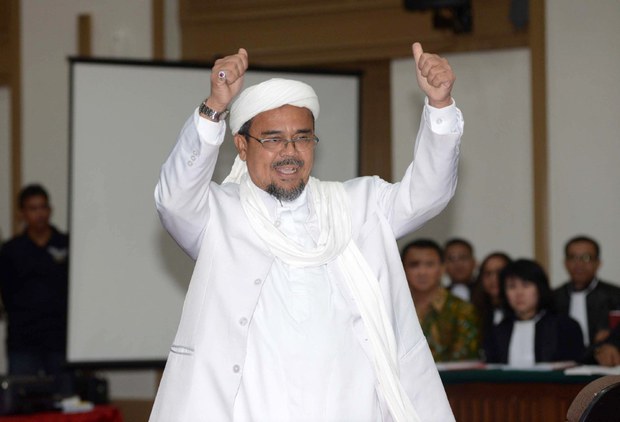Indonesia: Supporters of Hardline Indonesian Cleric Set up Think-Tank in His Honor
2018.08.20
Jakarta
 Indonesian cleric Rizieq Shihab gestures as he arrives in court to testify in the blasphemy trial of Jakarta Gov. Basuki “Ahok” Tjahaja Purnama, in the Indonesian capital, Feb. 28, 2017.
Indonesian cleric Rizieq Shihab gestures as he arrives in court to testify in the blasphemy trial of Jakarta Gov. Basuki “Ahok” Tjahaja Purnama, in the Indonesian capital, Feb. 28, 2017.
Supporters of hardline Indonesian cleric Muhammad Rizieq Shihab have set up a think-tank named after him in a sign of his growing stature at home as he fights legal troubles from a self-imposed exile in Saudi Arabia.
The Habib Rizieq Shihab Center, which was inaugurated in Jakarta over the weekend, aims to be a scientific and strategic research hub based on Islamic values for the benefit of Muslims and the country in general, said its chairman, Abdul Choir Ramadhan. “Habib” is an honorific used to address a Muslim scholar believed to a descendant of the Prophet Mohammad.
“The center is named after him because of his stature and as a show of our admiration for his struggle to uphold Islamic values,” Ramadhan told BenarNews. He said the center was self-funded but did not rule out public donations.
Rizieq, founder of the vigilante group Islamic Defenders’ Front (FPI), shot to political prominence after he led a campaign in 2016 and 2017 to oust then-Jakarta Gov. Basuki “Ahok” Tjahaja Purnama, a Christian of Chinese descent, over allegations that he had insulted the Koran in off-the-cuff remarks.
The center’s launch coincided with the 20th anniversary of the FPI’s founding. The group is notorious for past anti-vice raids targeting places accused of harboring sex workers and drug users, as well as nightspots that remained open during Ramadan.
Rizieq has been in a self-imposed exile in Saudi Arabia following attempts by Indonesian police to question him last year over allegations he had engaged in a lewd online chat with a female supporter and a separate charge of insulting the Indonesian state ideology of Pancasila.
Investigations into the cases were stopped this year with police citing a lack of evidence.
The cleric’s supporters said the cases against him were fabricated by the government of President Joko “Jokowi” Widodo because of Rizieq’s role in inflaming Muslim sentiment against Ahok, an ally of the president.
Ramadhan said Rizieq had doubts about returning home any time soon, saying the political climate is unfavorable.
“The investigations may have been dropped, but they can always reinstate them any time,” Ramadhan said.
For the ummah’s benefit
On Saturday, Rizieq delivered a speech through a telephone link during the ceremonial launch of the center.
“I hope that the HRS Center will become a place for the advancement of knowledge for the benefit of the Muslim ummah (society) and the country,” he said in the message posted on YouTube.
“This is in line with the principles of my struggle that I have always adhered to: That the Scripture must be above the Constitution, and that the Constitution should not deviate from the Scripture,” he said.
“The institutionalization of Sharia is inevitable for Islamic values are an inseparable part of our nation building,” he added.
Emrus Sihombing, a political analyst at Pelita Harapan University, described the center as a positive move.
“If the center is indeed engaged in scientific and strategic studies for the benefit of the ummah, it’s very good for public discourse because there will be debates on the merits of their ideas,” he said.
“It will be a lot more productive,” he said. “He is a leader who commands the strong loyalty of people who subscribe to his views.”
Rizieq played a key role in last year’s conviction and imprisonment of Ahok on blasphemy charges.
Conservative Muslim groups held protests against Ahok in 2016 and 2017 in the run-up to a gubernatorial election in which he was a front-runner after an edited video made it appear that he had said the Quran deceived people.
Ahok lost the Jakarta gubernatorial election to former Education Minister Anies Baswedan, who courted support of FPI and other conservative Muslim groups despite his liberal credentials. Ahok later was sentenced to two years in prison for blasphemy.
Ramadhan said the HRS Center would conduct studies, hold seminars, provide training as well as publish books to influence public discourse on Islam, including in the aspects of law, governance and public policy.
“We want to promote ideas of a system of governance based on Islamic values,” he said.
“There’s no contradiction between Pancasila (the state ideology) and Islamic teachings.”







